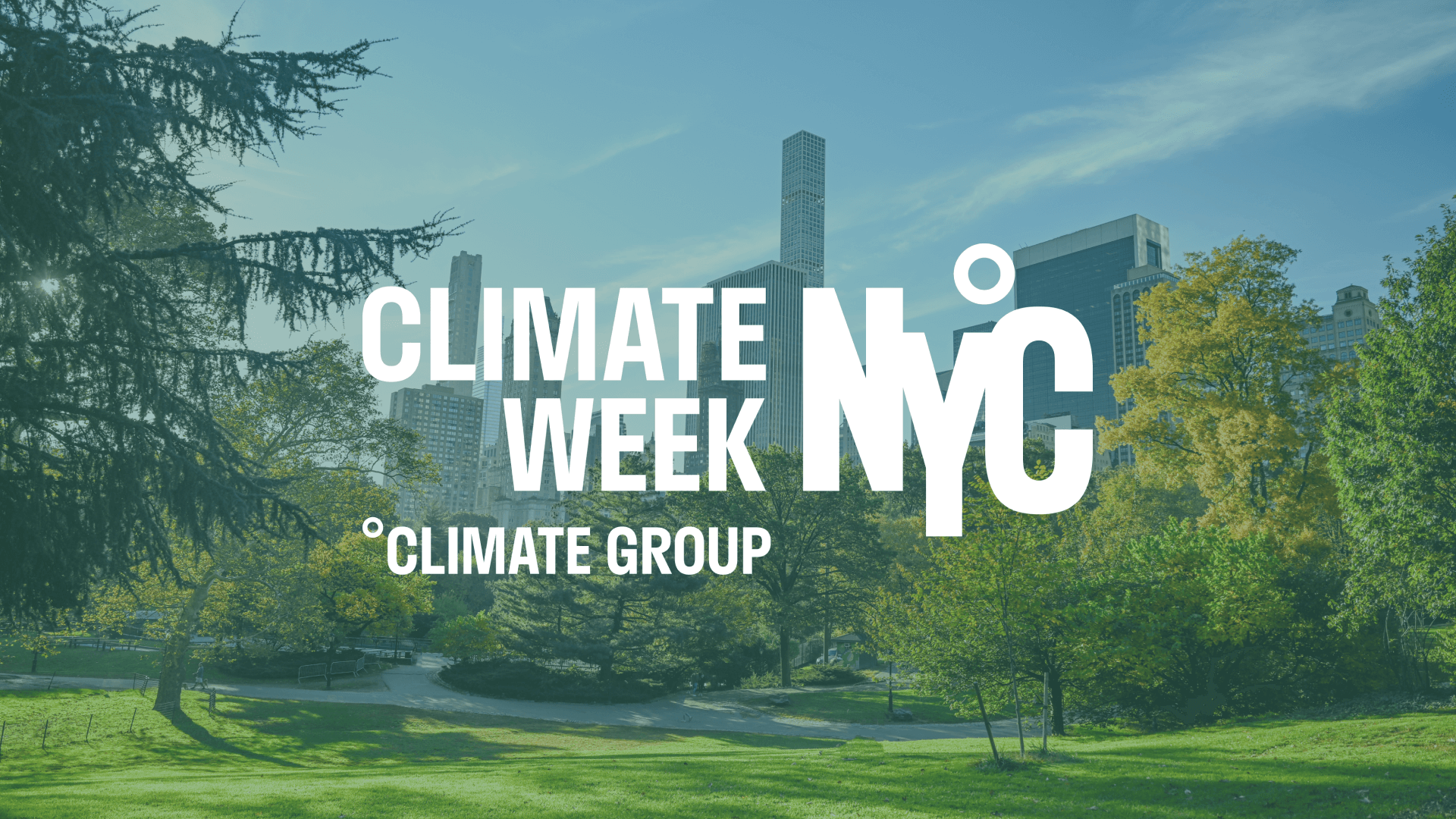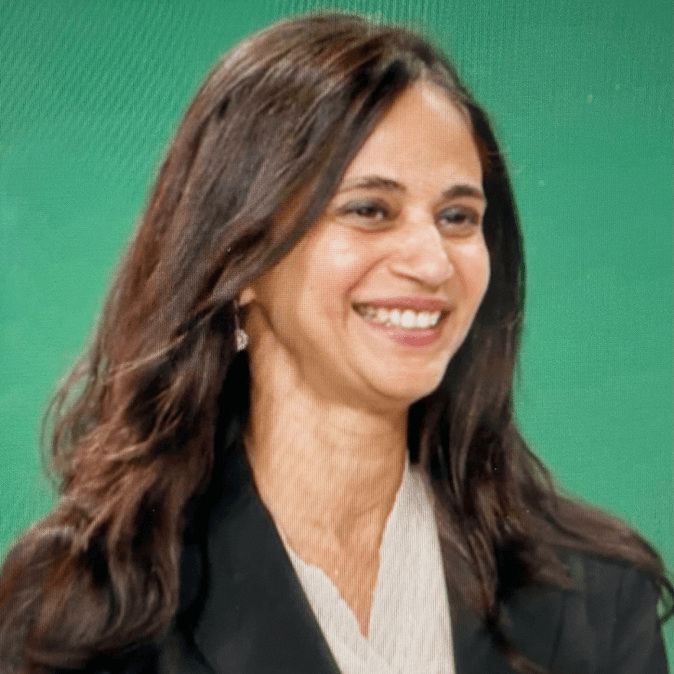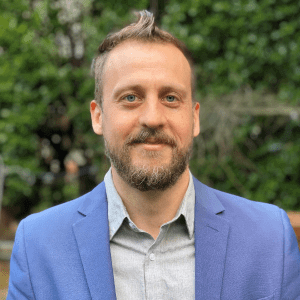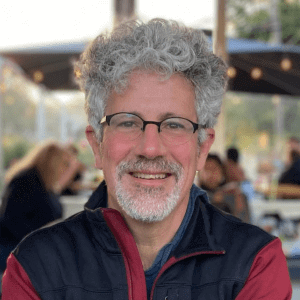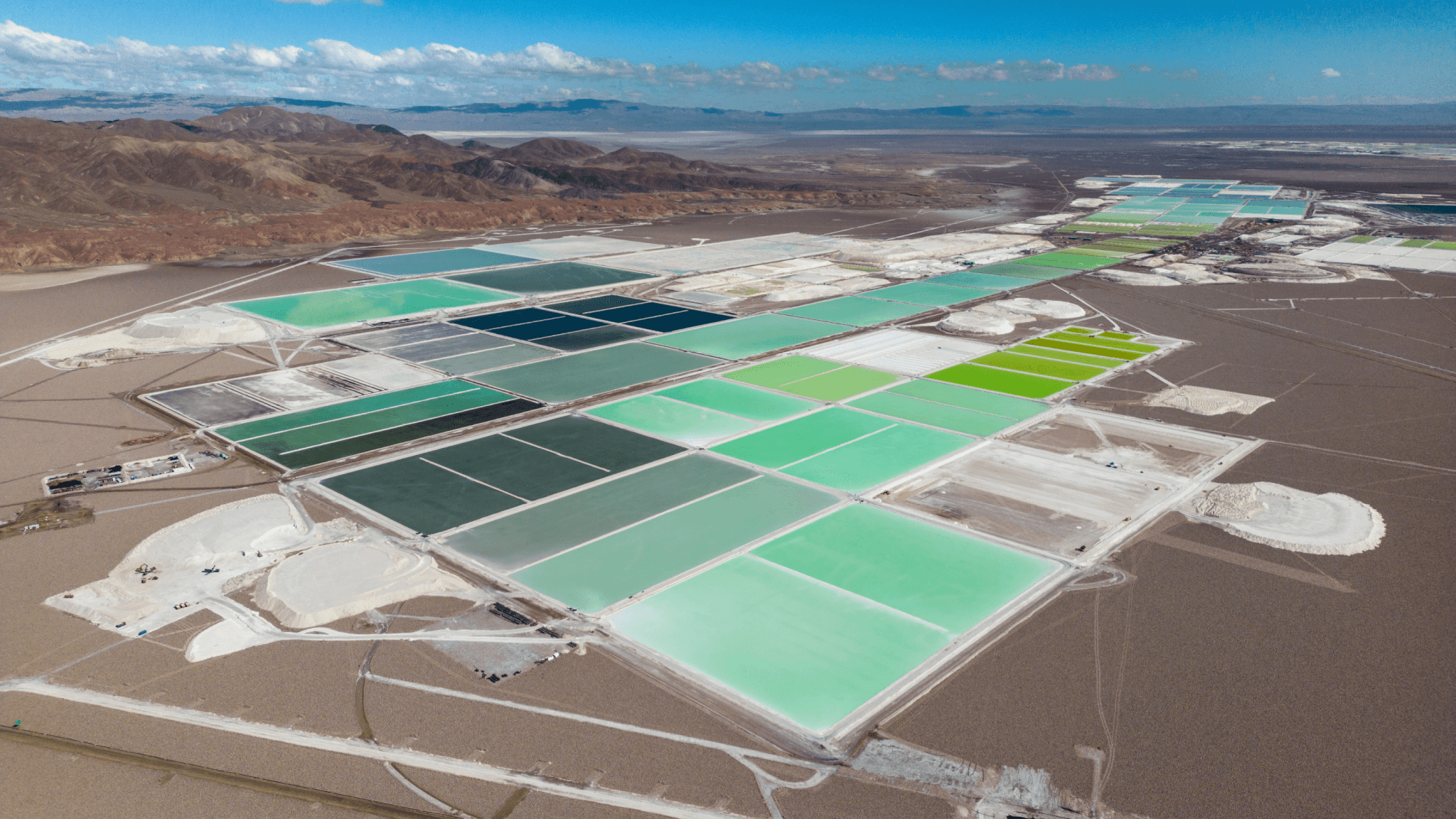
While the annual climate summit delivered some progress on accountability, implementation, and solidarity, it also revealed the magnitude of the work ahead.
The stakes were high as delegates from around the world convened a couple of weeks ago in Sharm El Sheikh, Egypt at the UN Climate Change Conference (COP27). The discussions at the summit underscored the urgency of the climate crisis and recognized that time is rapidly running out to limit global warming to 1.5° C. For the first time, there was an agreement that rich countries have a responsibility to provide financing to help vulnerable countries cope with the irreversible loss and damage from climate impacts they are already experiencing.
Relative to COP26 in Glasgow, the conference did not generate as many splashy headlines or news-making major commitments. Instead, the focus was on implementation. From this perspective, there were important discussions about accountability and transparency, and the actual implementation of climate solutions — including in sectors that had received little attention in the past, such as food systems.
Where COP27 fell short was on concrete efforts to strengthen emissions reductions, as is urgently needed to achieve a climate neutral world by mid-century. Under great pressure from the many fossil fuel lobbyists present at COP27, countries also failed to agree on text regarding the need to phase out fossil fuels.
Here are four key storylines from COP27 that will shape climate action in 2023 and beyond:
1. A turning point on loss and damage
After decades of resistance by wealthy nations, nearly 200 countries agreed to set up a fund to help countries cope with irreversible loss and damage from climate change impacts such as devastating storms, extreme heat, and rising sea levels. While the details of the facility are yet to be confirmed, including who will fund it and by how much, it represents a crucial breakthrough in what has long been a contentious issue at United Nations climate negotiations by formally recognizing the climate-related loss and damage already being felt by millions of people worldwide. And it recognizes that wealthy, industrialized countries that have historically contributed the most to climate change should step up with financing.
Barbados Prime Minister Mia Mottley emphasized it is “fundamentally unfair” that the people “whose blood, sweat and tears financed the industrial revolution” now also bear the costly burden of the resulting climate impacts. She laid out the Bridgetown Initiative, a set of proposals seeking to restructure the global financial system to address loss and damage and the mounting debt crisis in vulnerable countries.
For the first time, the final COP27 text calls for the reform of multilateral development bank and international financial institution practices and priorities to ensure they are fit for the purpose of adequately addressing the global climate emergency.
Key issues on the climate agenda in 2023 include the next steps to establish the Loss and Damage Facility, along with broader efforts to reform the international financial system to address the climate crisis.
2. Strengthening accountability and transparency
A key theme at COP27 that will remain a high priority in the months ahead was accountability and transparency for net-zero pledges. During the conference, the UN High-Level Expert Group on Net-Zero Commitments released a report that provides specific recommendations for industry, financial institutions, cities, and regions to ensure credible, accountable net-zero pledges. It was widely seen as an “anti-greenwashing” manifesto.
In recent years, an ecosystem of tools and approaches has been developed to help non-state actors set net-zero targets, identify pathways to achieve them, report progress, and be held accountable. Discussions on the sidelines of COP27 highlighted progress in the use of these tools, remaining gaps, and how they can best work together. As part of these, ClimateWorks and partners launched the Carbon Call roadmap, which outlines ways for companies to better discover, understand, and share GHG emissions data and close the gap in underreported GHG emissions.
COP27 also included an extensive technical dialogue to prepare for the first-ever Global Stocktake, a process that will take place every five years to hold countries collectively accountable for achieving the long-term climate goals outlined in the Paris Agreement. Partners of ClimateWorks’ independent Global Stocktake (iGST) initiative were on the ground in Sharm el Sheikh to support the Stocktake process by serving as experts representing civil society in the technical dialogues, advocating for strong outcomes during political negotiations, and sharing research. This first iteration of the Stocktake will culminate at COP28 in December 2023 and repeat every five years thereafter.
3. An increased focus on implementation
Compared with some previous UN climate conferences, COP27 had relatively few major new pledges and commitments. Instead, COP27 featured increased attention on the actual implementation of climate solutions. This included deeper discussions across issue areas such as food, agriculture, and forests, setting the stage for key themes that will be highlighted at COP28 in UAE in 2023.
While implementation is complex and not easy to distill into memorable soundbites, COP27 was a critical space for pushing the dialogue, activities, and connections needed to turn commitments into real progress and innovative solutions. At COP27, this included, for example, the Arsht-Rock Resilience Center and partners’ launch of the Cool Capital Stack, a $750 million investment pipeline to fund clean cooling projects. The pipeline takes an integrated approach to advance clean cooling solutions and protect people from extreme heat driven by climate change.
In another example, the governments of France and Spain, along with private sector leaders, signed the Zero-Emission Vehicle Declaration, which supports shifting to 100% zero-emission light vehicle and van sales. Through the Global Commercial Drive to Zero Memorandum of Understanding, the United States, Ukraine, and Ireland joined 23 other nations in committing to 100% zero-emission new truck sales by 2040. The Egyptian Presidency launched the LOTUS initiative for urban transport in the Global South that includes support for investment in infrastructure for electric vehicles with an emphasis on logistics transport and electric buses.
The COP27 proceedings also reflected a shifting understanding of the role of carbon dioxide removal (CDR) solutions in addressing the climate crisis. During the conference, innovators and leaders from across Africa, Asia, and Latin America voiced their interests and activities with CDR and described it not only as a way to repair and restore the climate — but also to generate economic benefits through job creation, infrastructure development, and technology transfer. At the conclusion of COP27, parties were invited to submit their views on a more methodologically robust and inclusive approach to carbon removal in Article VI of the Paris Agreement ahead of the next conference, which means carbon removal will likely be a key area of focus for COP28.
4. Committing to a just transition
COP27 also saw a series of commitments toward achieving a just transition for workers and communities in the shift away from fossil fuels. This included the establishment of a Just Transitions Work Program under the UN climate conference, with annual high-level ministerial round tables to start at COP28 next year, as well as side announcements on country-targeted support.
The government of South Africa unveiled a Just Energy Transition Investment Plan (JET IP) for 2023 to 2027, which built on the major COP26 announcement of support for South Africa’s Just Energy Transition by G7 countries. The plan aims to catalyze South Africa’s efforts to achieve ambitious emissions reductions by 2030 as outlined in its Nationally Determined Contribution, which is premised on enabling a just transition for affected communities and regions. The plan identifies the energy, electric vehicles, and green hydrogen sectors as key areas for financial investment. Philanthropic organizations including ClimateWorks have announced their support for South Africa’s investment plan.
At the G20 summit, which was held in Bali overlapping the second week of COP27, the government of Indonesia announced a record $20 billion Just Energy Transition Partnership (JETP) in agreement with the governments of the United States, Japan, and partners. The long-term partnership aims to create an ambitious and just power sector transition in Indonesia, aligned with the 1.5 °C target outlined in the Paris Agreement.
Additionally, a coalition of leading climate funders announced the launch of a three-year, $500 million commitment to support a just and equitable transition away from fossil fuels and toward renewable energy. This coalition will build on existing multi-donor efforts that are ratcheting ambition and supporting government, community-level, and corporate actions in countries and communities experiencing the worst impacts of climate change.
Looking ahead: opportunities for philanthropy
Overall, COP27 underscored the interconnectedness between climate change and a wide range of global crises — and the need for integrated solutions across a variety of social, economic, and political issues. Philanthropy has a responsibility and opportunity to accelerate and scale up its efforts to address climate change, including at the intersection of climate adaptation, mitigation, and resilience.
A number of notable philanthropic commitments were announced at COP27. For example, 13 foundations including ClimateWorks announced the formation of a new Forests, People, Climate collaborative to mobilize support for stopping deforestation and protecting the rights of Indigenous and local communities, with a total of $780 million in funding committed. The collaborative aims to raise another $1.2 billion over the next five years. Another group of philanthropic organizations and investors announced a $21.5 million commitment toward improving the efficiency of fertilizer manufacturing and use to help address a fertilizer shortage driven by the Ukraine crisis. This commitment builds on a larger funding effort led by the U.S. government and other partners in the public and private sectors.
Despite this momentum, there is much more the philanthropic sector can do to catalyze climate ambition, help turn the billions of public and private investments into trillions, and to move more funds faster to the places that need them the most. Although COP27 has concluded, the work continues into 2023 and beyond with ever-increasing urgency.

Here’s how you can follow ClimateWorks and our global partners during the COP27 conference.
The U.N. Climate Change Conference (COP27) in Sharm El Sheikh, Egypt comes at the end of a critical year in the fight against the climate crisis. Over the last year, we’ve seen severe climate shocks, a growing food crisis, global inflation, an energy crisis driven by the Russia-Ukraine War, and conflict and instability in many parts of the world. At COP27, leaders must advance solutions to these multiple crises by accelerating action and global cooperation on climate.
ClimateWorks is joining our global partners in Egypt to continue raising ambition and building momentum for philanthropy so that more funds can move faster to the places that need them the most. We will support leaders in advancing people-centered approaches to a just and equitable transition. We’ll also focus on promoting efforts for transparency and accountability in implementing commitments.
Whether you’re joining COP27 in-person or online via live stream, here are some events we recommend attending.
ClimateWorks on the ground
Global Public Opinion on Climate Change
Tuesday, November 8, 12:30 to 1:30 PM (EET), China Pavillion
The China Center for Climate Change Communication (China4C) will share the key findings of its third national survey of public perception of climate in China. The Yale Program on Climate Change Communication (YPCCC), in collaboration with Meta Data for Good, the Global Strategic Communication Council – India (GSCC), and the Instituto de Tecnologia & Sociedade do Rio (ITS Brazil), will report the results of a global survey and nationally representative surveys in the United States, India and Brazil investigating public climate change beliefs, risk perceptions, and policy support, such as support for the Paris Agreement and for more ambitious climate action by each national government.
ClimateWorks’s Helen Mountford and Xiaohua Zhang are scheduled to speak. This event is co-hosted by the China Center for Climate Change Communication (China4C) and the Yale Program on Climate Change Communication.
What Action is Needed Across Systems by 2030 to Limit Warming to 1.5° C?
Wednesday, November 9, 9:00 AM to 10:00 AM (EET), We Mean Business Pavillion in the Blue Zone
Delivering climate action by 2030 to limit warming to 1.5° C will require rapid transformations across our major systems – energy, industry, food, forest and land, finance, and more. To what extent are we on track? Where is change accelerating or lagging? What trends are revealed across these interconnected systems? How can we bolster the enabling conditions needed to scale transformation and navigate barriers? Join Systems Change Lab at COP27 as we unveil our new open-source data platform and discuss the latest findings from the State of Climate Action 2022.
ClimateWorks’ Casey Cronin is scheduled to speak. This event is organized by Systems Change Lab: World Resources Institute and Bezos Earth Fund.
The Cool Capital Stack: Investing in Cooling Solutions to Protect People and Their Livelihoods
Wednesday, November 9, 11:00 AM to 12:00 PM (EET), Resilience Hub
This conversation will feature private, public, and civil society actors who are making tangible progress towards scaled solutions that cool cities, delivering critical health, equity, resilience, and economic outcomes. The session will launch the Cool Capital Stack, a new initiative to mobilize all forms of capital to invest in cooling solutions that protect people and their livelihoods from extreme heat.
ClimateWorks’ Helen Mountford is scheduled to speak. This event is organized by Arsht-Rock.
The Paris Agreement Aspirations Through the Implementation of Nationally Determined Contributions in the COMESA and EAC Regions
Wednesday, November 9, 5:00 PM to 6:00 PM (EET), NDC Pavillion
ClimateWorks’ Cherono Sego is scheduled to speak. This event is organized by the East African Community Secretariat.
The Carbon Call at the Action Hub
Thursday, November 10, 2:00 PM to 2:40 PM (EET), The Action Hub in the Blue Zone – more information here
There is a gap between what is reported as greenhouse gas emissions and actual emissions in carbon accounting. That’s why ClimateWorks, Microsoft, the United Nations Environment Programme (UNEP), and others launched the Carbon Call, a fast-growing global corporate initiative working to address interoperability or how greenhouse gas emissions data is compared, combined, and shared. Learn more about the Carbon Call at this TED-style talk at the Action Hub.
This event is organized by ClimateWorks.
Responsible Leadership Expert Session: Accelerating the Carbon Removal Market
Thursday, November 10, 6:00 PM to 7:00 PM (EET), Global Innovation Hub in the Blue Zone
This session will focus on how to overcome those barriers for buyers and discuss how to convey the relevance of carbon removal to the broader business and investing community, as more commitments will be crucial for accelerating and driving down costs for carbon removal technologies. Additionally, the session will explore and evaluate new forms of collaborations and partnerships and their potential to dynamize the scaling of carbon removal technologies.
ClimateWorks’ Frances Wang is scheduled to speak. This event is organized by the BMW Foundation and the UNFCCC Global Innovation Hub.
The Carbon Call at the International Chambers of Commerce Pavillion
Friday, November, 11, 2:00 PM to 3:00 PM (EET), International Chambers of Commerce Pavillion
There is a gap between what is reported as greenhouse gas emissions and actual emissions in carbon accounting. That’s why ClimateWorks, Microsoft, the United Nations Environment Programme (UNEP), and others launched the Carbon Call, a fast-growing global corporate initiative working to address improved interoperability or how greenhouse gas emissions data is compared, combined, and shared. Members of the Carbon Call will outline four key constraints in carbon accounting and recommendations on how to address them.
This event is organized by Microsoft and ClimateWorks.
Ethics & Climate Action: Establishing a Framework
Friday, November 11, 4:30 PM to 6:00 PM (EET), Ocean Pavilion
The American Geophysical Union (AGU) is convening a diverse panel of international advisors to take part in designing an ethical framework that will guide decisions about the potential use of intervention technologies. Immediate and coordinated actions to reduce greenhouse gas emissions and build resilience should be prioritized to protect human health, biodiversity, economic well-being, and global security. The ethical framework for climate intervention is a critical part of these actions.
Climateworks’ Frances Wang is scheduled to be a panelist. This event is organized by the AGU.
Carbon Dioxide Removal FutureLab
Friday, November 11, 5:00 PM to 6:30 PM (EET), Ibis Room in the Green Zone/Climate Action Zone
This event will highlight the diverse, dynamic, and vibrant carbon removals ecosystem that is emerging across the Global South and in other marginalized regions, leveraging new technologies and approaches to accelerate the transition to clean growth, build infrastructure, and create jobs. The session will explore what it will take to scale these efforts.
ClimateWorks’ Helen Mountford is scheduled to speak. This event is organized by UN Climate Change High-Level Champions Nigel Topping and Dr. Mahmoud Mohieldin and supported by ClimateWorks.
Policy innovations at the ocean-climate nexus to accelerate decarbonization, address climate change, and improve the blue economy
Saturday, November 12, 9 AM (EET), Ocean Pavilion
This session looks at policy innovations in the ocean space, to date, and how these policies will deliver meaningful impacts to improve both ocean and climate health. Select policy innovations to be discussed include: sustainable aquaculture and seafood as a decarbonization pathway, incentivizing ocean-based renewable energy, shipping and reducing plastic production and usage, and research for blue carbon and marine CDR.
ClimateWorks’ Frances Wang will be moderating. This event is organized by (NASEM), Ocean Conservancy, and the ClimateWorks Foundation.
The Global Stocktake – a Health Check for the Paris Agreement
Saturday, November 12, 10:00 am (EET) in the Health Pavillion
The event aims to highlight the importance of including health-specific metrics in the Global Stocktake (GST) and will present available evidence that could feed into this process. A representative from the independent Global Stocktake initiative (iGST) will provide an overview of the GST, its crucial role in the Paris Agreement, and the latest developments at the Second Meeting of the Technical Dialogue (TD1.2) taking place at COP27.
ClimateWorks’ Josefina Cobián is scheduled to speak. This event is organized by the Lancet Countdown.
China-Africa Cooperation on the Renewable Energy Transition
Monday, November 14, 6:30 PM to 8:00 PM (EET) in the Khufu (300) Room of the Blue Zone
Get the latest insights on China-Africa cooperation on renewable energy investments and local value creation in African countries and take part in the launch of African Energy Now.
This event is co-organized by the Chinese Renewable Energy Industries Association (CREIA) and the Institute for Environment and Development Sustainability (IEDS) in partnership with the ClimateWorks Foundation and the China Africa Advisory.
High-Level Dialogue on Enabling the Scaling Up of Renewable Energy in Africa
Tuesday, November 15, 1:30 PM to 2:30 PM (EET), SDG7 Pavilion
A high-level dialogue that brings together global leading enterprises, financial institutions, intergovernmental agencies, and research institutions working in the renewable energy field for a deep-dive discussion on scaling up Africa’s renewable energy industry.
ClimateWorks’ Xiaohua Zhang will moderate this event. This event is organized by ClimateWorks, SEforAll, the Africa Climate Foundation (ACF), CREIA, and the World Resources Institute (WRI).
Building an Inclusive Global Stocktake: Expanding upon Non-party Inputs to the Global Stocktake
Tuesday, November 15, 4:45 PM to 6:15 PM (EET) in the Blue Zone – watch online
The Global Stocktake is a key mechanism to raise ambition across mitigation, adaptation, and finance, and in light of equity considerations and the best available science. Non-party inputs can help build up the political momentum within the GST to trigger nationally enhanced ambition as well as increase climate ambition.
This event is organized by UNFCCC and co-organized by ClimateWorks.
Green Climate Finance at the Center of Just Energy Transition – Perspectives from the Global South
Tuesday, November 15, 3:00 PM to 4:00 PM (EET) – watch online
Global energy poverty is concentrated in Sub-Saharan Africa (SSA). Currently, around 580 million in the region, roughly 75% of the global total, have no electricity (IEA, 2019). An estimated 80% of the population lack access to modern energy and rely on biomass such as wood, charcoal, and cow-dung to cook. While efforts at electrification are expected to bring down the number of people who don’t have access to electricity, the number of people using unimproved cooking facilities is expected to increase through 2030.The session will highlight the win–win situations and co-benefits of clean energy transitions in the Global South.
ClimateWorks’ Cherono Sego is scheduled to speak. This event is organized by The Africa SLCP Project.
Blue Climate Solutions: Considering the Ocean’s Role in our Path to Net Negative Emissions
Thursday, November 16, Time: 8:30-10:00 AM (EET)
This event is organized by the American Geophysical Union, National Academies of Sciences, and Woods Hole Oceanographic Institute.
Beat the Heat: Nature for Cool Cities Challenge
Wednesday, Nov 16, 9:00 AM to 10:00 AM (EET), SDG7 Pavilion – register here
Our cities are getting hotter. Nature can help reduce urban temperatures and increase thermal comfort for urban dwellers. The cooling benefits of nature-based solutions are well documented, but they need to be better understood and leveraged to increase implementation and bring about change at a global level. These include habitat provision, improving air quality, and human health outcomes; increasing resilience to flooding, waterborne diseases, and soil erosion by increasing water permeability; bringing social cohesion and higher quality of life to communities; and delivering significant economic benefits.
ClimateWorks’ Axum Teferra is scheduled to speak. This event is organized by SEforALL and the Cool Coalition.
Just Transition in the Agricultural Sector: Pathways for Sustainable and Inclusive Climate Action in Agri-food Systems
Wednesday, November 16, 1:00 PM to 2:00 PM (EET), FAO Pavilion
ClimateWorks’ Cherono Sego is scheduled to speak. This event is organized by the Food and Agriculture Organization of the United Nations (FAO) and ClimateWorks.
Getting it Done: Public-Private Actions for Decarbonizing Road Transport
Wednesday, November 16, 5:30 to 6:30 PM (EET) – watch online
With 33% of city GHG emissions resulting from road transport, public and private leaders must urgently align business and policy actions to deliver the promises made at COP26. To meet decarbonization targets, an ambitious mobility policy aimed at emission and air pollution reduction must be met with industry support and investment. Join this session to hear how cities and businesses are working together to provide affordable, safe, and efficient zero-emission mobility.
ClimateWorks’ Helen Mountford will moderate this virtual panel discussion. This event is organized by the Global New Mobility Coalition at the World Economic Forum.
The Cool Move: Low Carbon Cold Chain and Agro-logistic Revolution for Emerging Markets
Thursday, Nov 17, 2:30 PM to 3:15 PM (EET), Food Systems Pavilion – watch online
This cold chain event will focus on promoting the development of cold chain solutions (both accessibility and utilization) in rural areas, based on bankable and scalable business models, via appropriate financial solutions and backed by market linkages and data.
ClimateWorks’ Axum Teferra is scheduled to moderate. This event is hosted by the Cool Coalition.
Partner Events at COP27
Clean Cooling Collaborative Partners
Our Clean Cooling Collaborative partners are hosting a series of events at COP27 to highlight the importance of sustainable cooling solutions that meet our climate ambitions and keep people, food, and medicine safe in a warming world. Please check them out here.
Drive Electric Campaign Partners
Our Drive Electric Campaign partners are hosting a series of events at COP27 to raise ambition and showcase the role of decarbonizing transportation in meeting our climate goals. Please check them out here.
Carbon Removals at COP Virtual Pavilion
November 6 to November 18, 2022 – more information here
Carbon Removals at COP is a dedicated online platform that will stream 15+ events and publish daily commentary, news, and thinking on carbon removals during COP27 and beyond.
Food Systems Pavilion
November 6 to 18, Blue Zone – more information here
Many of our partners are sponsoring the first-ever Food Systems Pavilion at COP27, putting food center stage during these crucial negotiations.
A Roadmap to Aligning Food, Finance, and Philanthropy with Climate Goals
Wednesday, November 9, 8:30 to 9:30 AM (EET), Food and Agriculture Pavilion (Blue Zone) – more information here
The FAIRR Initiative’s Policy Director Dr. Helena Wright will moderate a panel discussion exploring how private, public, and philanthropic funding in food systems can align with climate goals, and the role a global agricultural roadmap could play. Panelists will include speakers from FAO, Planet Tracker, WINGS, and private finance.
This event is organized by the FAIRR Initiative, Planet Tracker, and WINGS.
International Solar Alliance Launch of Solar Investment Roadmap
Wednesday, November 9, 11:30 AM to 1:00 PM (EET), International Solar Alliance (Blue Zone) – more information here
How can philanthropy effectively coordinate its engagement to deepen impact and scale catalytic capital, at the right level of intervention, in a manner that crowds in additional finance? What partnerships are required to achieve that goal? This session will focus on addressing these questions. This dialogue looks to focus on philanthropic support as a catalyst for scaling clean energy access and investments in resilience in Africa, using illustrative examples that clearly identify the opportunities, challenges, and gaps for accelerating just transitions.
This event is organized by the International Solar Alliance (ISA) and features context setting by Bloomberg Philanthropies.
Global Governance of CDR: Carbon Accounting of Transboundary Projects
Thursday, November 10, 1:00 to 2:00 PM (EET), Blue Zone – more information here
Many projects to permanently remove CO2 from the atmosphere will have international supply chains and will involve transporting biomass, materials and CO2 across boundaries. This session will discuss the possible accounting issues which may arise from such international CDR projects.
This event is organized by Bellona.
Advancing Sustainable Protein to Meet Climate Goals
Thursday, November 10, 5:45 to 7:00 PM (EET) | Food4Climate Pavilion (Blue Zone) – more information here
This event will showcase three AIM4C Innovation Sprints that emphasize the clear role of alternative protein in catalyzing climate action and creating sustainable food systems.
This event is organized by the FAIRR Initiative.
Ensuring Healthy Diets for All in Face of a Warming Planet: Challenges, Opportunities, and Solutions
Friday, November 11, 1:15 PM to 2:45 PM (EET) – more information here
Organized by Costa Rica, Switzerland, UN Nutrition, and UNEP in partnership with Chatham House, Life and Environment (L&E), and United Cities and Local Governments (UCLG)/ICLEI. This event examines food, nutrition, and climate change´s interlinked challenges and recommends key multi-stakeholder policy actions for reducing GHG emissions through healthy and sustainable diets.
Fueling Health Harms: The Human Costs of Fossil Fuels
Friday, November 11, 2:00 PM to 3:30 PM (EET), WHO Pavilion – more information here
The Global Climate & Health Alliance will host this event, which will be moderated by Jane Burston, Executive Director of the Clean Air Fund.
Food System Climate Solutions: Managing Climate Risks and Externalities From The Food System
Friday, November 11, 3:00 to 4:30 PM (EET), Tutankhamun Room in the Blue Zone
This event is organized by the Citizens’ Climate Education Corp, the Rockefeller Foundation, and the True Animal Protein Price Coalition. Global food systems make up one-third of greenhouse gas emissions and are a key driver of nature loss. This panel highlights ways the public and private sectors can address these risks, including true-cost accounting, sustainable food pledges and pricing, and Good Food Finance interventions.
Building Resilience in the East African Community and Sub-Saharan Africa: Challenges and Opportunities
Friday, November 11, 4:45 PM to 6:15 PM (EET), Room 9 in the Blue Zone
This event will help illustrate how the East African Community region — and sub-Saharan Africa more generally — is implementing strategies that harness nature-based solutions for adapting to climate change. The event will focus on opportunities and challenges in financing these solutions. Additionally, it will help highlight options for leveraging local knowledge and promoting leadership in adaptation-related actions.
Regional Policy Approaches to Decarbonise Shipping & Freight & Support Sustainable Port Communities
Saturday, November 12, 11:30 AM to 1:00 PM (EET), Thutmose Room in the Blue Zone
Governments, NGOs, industry, and academia will host a collaborative forum on the EU’s Fit for 55 package, the US Clean Shipping Act, and electrification and green fuels projects in the European Union, the United States, and Africa, sharing how mutually-reinforcing infrastructure, energy, and economic policies can decarbonize freight and transform port hubs.
High-level Forum on South-South Cooperation on Climate Change
Monday, November 14, 9:00 AM to 12:30 PM (EET), China Pavilion
The forum aims to sustain and mobilize enhanced support for pragmatic South-South cooperation and triangular cooperation on climate action, so as to build the confidence and increase ambition needed for further advancing the implementation of the Paris Agreement.
This event is organized by SEforAll and the Foreign Environmental Cooperation Center (FECO).
Coal in Net Zero Transitions: Strategies for Rapid, Secure and People-Centered Change
Tuesday, November 15, 11:30 AM (EET) – livestream here
Release of a new report that will explore the options for the power sector and other parts of the economy where coal plays a notable role. It will examine a range of policy and technology areas, including the potential for carbon capture, utilization and storage. It will also address investment and financing needs, taking into account the importance of ensuring reliable and affordable energy supplies and of tackling the social consequences of change.
A Mobility Just Transition: Perspectives on Inclusive Transport, Including Aviation Tuesday, November 15, 11:30 AM (EET),
Amon Room in the Blue Zone – more information here
This event will explore a just transition to sustainable mobility, with a particular focus on regional and gendered perspectives. It will include a deep dive into the hard-to-abate aviation sector to discuss how equitable net-zero aviation could be delivered while ensuring access to mobility for all.
This event is organized by the International Council on Clean Transportation (ICCT).
Policy Frameworks for Ocean-Based Climate Solutions at Scale
Tuesday, November 15, 12:30-1:30 PM (EET), Climate Education Hub – more information here
This event will feature leading policymakers and ocean-environmental scientists in an interactive framework to advance ocean-based climate solutions at scale.
This event is organized by Ocean Visions.
Ocean-Based Climate Solutions: Enabling Frameworks for Action
Tuesday, November 15, 12:30 (EET), Climate Education Hub – more information here
This event will feature leading policymakers, scientists, and ocean experts in an interactive discussion that will focus on the next steps for creating supportive, equitable, and collaborative policy frameworks to advance research and testing of ocean-based climate solutions at scale.
This event is organized by Ocean Visions.
Carbon Dioxide Removal (CDR) as an Ocean Climate Solution: Urgently Taking a Precautionary Approach
Tuesday, November 15, 3 to 4 PM (EET), Conference Room 5, Blue Zone
The side event will consider the complexities of ocean CDR and explore actions to minimize negative impacts. It will feature perspectives from scientists, representatives from non-governmental organizations, and technical experts who focus on ocean CDR planning and nature-based climate solutions.
This event is organized by the Ocean Conservancy and features Sarah Cooley, Director of Climate Science and Anna-Marie Laura, Director, Climate Policy.
Key Principles to Save The Carbon Cycles
Wednesday, November 16, 1 to 2 PM (EET), Bellona Pavilion – more information here
This session will present the importance of keeping efforts to reduce emission reductions separate from carbon removal. At the same time, it will be important to manage the geological and biological carbon cycles separately to ensure a sustainable path to net-zero.
This event is organized by Bellona.
Carbon Capture with Seaweed Cultivation – How to Do It Right
Wednesday, November 16, 4 to 5 PM (EET), Bellona Pavilion – more information here
During the event we will discuss and learn more about which climate effects seaweed cultivation can have depending on the use of the biomass and how we can develop a future seaweed industry that can contribute to net zero emissions.
This event is organized by Eli Mitchell-Larson.
Planning, Design, and Development in the Global South: The “How To” for People + Planet
Wednesday, November 16, 4:45 to 6:15 (EET), Room Hatshepsut (300) in the Blue Zone – more information here
Africa and the Global South will construct billions of square meters of buildings and infrastructure by 2030. Presenters will set out necessary design and construction guidelines, with regional examples, for equitable and resilient development to meet 50% x 2030 emissions reduction targets.
This event is organized by Architecture 2030, the American Society of Heating, Refrigerating and Air-Conditioning Engineers (ASHRAE), and the International Network of Women Engineers and Scientists (INWES).
Accelerating the Path to Paris-Aligned Maritime GHG Emissions by 2050 through Cross Value Chain Collaboration
Wednesday, November 16, 5:30 to 6:30 (EET), U.S. Pavilion
Achieving the goal laid out by the Biden Administration to put the maritime shipping sector on a pathway to zero emissions by 2050 requires innovative, high-ambition collaboration across the value chain. In alignment with the Administration’s recently announced Green Shipping Challenge for COP27, this session will feature perspectives from across the shipping value chain — from ports to academia to cargo owners to maritime industry — discussing how they are contributing to the creation of concrete, ambitious decarbonization pathways.
Accelerating the Global Transition to Zero-emission Vehicles
Thursday, November 17, 3:00 to 4:30 PM (EET), Global Action Rooms in the Blue Zone
Supporting the sustainable transport objectives of Solutions Day, this high-level event will look at progress made since COP26 in the global transition to Zero-Emission Vehicles (ZEVs). This session will see the launch of the Accelerating to Zero (A2Z) Coalition, supported in part by the Drive Electric Campaign, and will showcase new action from countries, sub-nationals, and non-state actors to take forward commitments towards 1.5° C.

It’s time to turn international commitments into action and accelerate a people-centered transition from coal to clean energy.
As the UN Climate Change Conference (COP27) in Egypt and the G20 meeting in Indonesia approach this November, new reports are highlighting a substantial gap between current government commitments to climate action and what is needed to keep our 1.5° C goal within reach. Governments around the world face the difficult task of balancing efforts to accelerate climate solutions as they respond to global inflation, the energy crisis driven by the Russia-Ukraine War, and, in many countries, political instability.
Complacency and a lack of action can only lead to global catastrophe. This is the critical decade for deploying clean energy at the scale and speed needed to keep our climate goals within reach.
Governments are collaborating to advance the global clean energy transition
Despite challenging political and economic conditions, governments have continued to build momentum over the past year toward accelerating the global transition to clean energy.
The Glasgow Breakthrough Agenda, which was launched at COP26 in November 2021, has gathered commitments from 45 countries that represent more than 70% of the global GDP to dramatically accelerate the innovation and deployment of clean energy technologies by 2030. The latest Breakthrough Agenda report has identified progress on reducing emissions in five key sectors: power, hydrogen, road transport, steel, and agriculture. In September 2022, the Clean Energy Ministerial and Mission Innovation were announced as the future home of the Breakthrough Agenda. This will help ensure that all the Breakthrough Agenda’s signatories adopt long-term implementation efforts and that countries can work together to push for more sectoral breakthroughs that enable affordable and accessible clean energy solutions for all.
At the Global Clean Energy Action Forum (GCEAF) in Pittsburgh in September 2022, 16 countries committed a total of $94 billion for clean energy demonstration projects, which will scale and bring to market technologies required to achieve net-zero emissions by 2050. The United States is devoting $21.9 billion to clean energy demonstrations. The remaining investment commitments are from Australia, Canada, the European Commission, Finland, France, Germany, Japan, the Netherlands, Norway, Poland, the Republic of Korea, Singapore, Sweden, the United Arab Emirates, and the United Kingdom.
During COP26, the Global Coal to Clean Power Transition Statement obtained signatures from 190 governments, financial institutions, and companies committing to phase out coal power. This coalition notably includes 23 countries making first time commitments to the phase out of coal. Nonetheless, there is a need for much more work and innovation dedicated to the early retirement of coal, especially in Asian economies, where the majority of the coal fleet is located (there are still hundreds of gigawatts of new coal-fired power plants being announced or under construction, which will lock in emissions for decades).
In May 2022, G7 members announced plans to “predominantly” decarbonize electricity sectors by 2035 and to end public financing of overseas fossil fuel projects. Yet, one question remains: can all G7 countries take further steps toward an eventual phase-out of domestic coal power generation by 2030?
There is a growing number of initiatives working toward a just and equitable transition. For example, at COP26, 13 countries joined the International Just Transition Declaration, an initiative that aims to create new jobs and elevate champions through local social dialogue as communities move away from coal and high-carbon industries in emerging economies. Additionally, Clean Energy Ministerial members are increasing their collective actions to advance skills training, youth empowerment, and gender equality to a new clean energy economy that supplies high-quality jobs.
Priorities for the work ahead
While there has been notable progress in the last year, scaling the global clean energy transition will require more collective willpower and accelerated action. At ClimateWorks, we support bold targeted action; more collective commitments and participation from governments; rigorous tracking to hold governments, businesses, and financial institutions accountable to their commitments; and efforts that center the people and communities who will drive the transition forward.
Heading into COP27, the G20, and beyond, ClimateWorks and our partners will work toward these three key priorities:
1. Ramp up solar energy deployment
The energy transition requires accelerating the deployment of solar and wind power, smart grids, and energy storage to become the backbones of countries’ electricity decarbonization strategies. Among all the clean energy solutions, solar should be the “king” of deployment for decarbonizing the electricity sector for this decade. Limiting global temperature rise to 1.5° C will require tripling investments in renewable energy by the end of the decade, including expanding the deployment of solar energy by 4 times relative to current levels by 2030. This seismic shift will create jobs on both the manufacturing side and the installation and maintenance side of the solar industry. Achieving this will require the right conditions, including a combination of finance, regulatory and policy frameworks, government initiatives, and infrastructure development. This will enable countries to not only absorb solar capacity but also build the appetite and demand for solar energy, including the ability to meet quality standards and increase the quantity of local production and supply.
2. Ensure the energy transition is a just transition
A successful clean energy transition will require a focus on people-centered approaches. The expanding clean energy economy will provide a massive amount of new jobs and opportunities for people around the world, but not everyone will transition at the same time and market expansion alone is insufficient. It is crucial to center investments in jobs and workforce development to ensure a people-centered, just, and equitable transition.
Therefore, we need to plan out and chart the economic and employment pathways for everyone, particularly for countries and communities most likely to be left behind. Critical questions include:
- What will the workforce look like and what skills are needed for a clean energy economy?
- Where will the clean jobs be located and who will have access to them?
- How do we ensure the global energy transition is equitable and inclusive?
3. Accelerate finance and investment deployment, especially in emerging markets and economies
The annual average growth rate in clean energy investment after the 2015 Paris Agreement is just over 2% and clean energy investment into emerging markets and developing economies is far less than the $1 trillion per year required by 2030 to reach net-zero emissions by 2050. We support developing more public and private partnerships to de-risk investments, continuing to address the needs of project preparation, lowering the cost of capital and currency risks in emerging markets, and addressing regulatory issues to mobilize large-scale, private finance for emerging economies. To create confidence for investors at the country level, there must be alignment between government and investor priorities, a regulatory system that encourages investment, and market appetite. Catalyst funding, including climate philanthropy, could spark larger public and private capital investment to boost the rapid deployment of clean energy projects and build up a robust clean energy manufacturing supply chain.
Philanthropy can help build momentum for the clean energy transition
Philanthropy can play a key role in the global clean energy transition — but the level of ambition must meet the urgency of the crisis.
Historically, philanthropic investments in climate change mitigation have been heavily concentrated in Europe and the United States. Nonetheless, in recent years, climate philanthropy has taken steps to catalyze large-scale public and private investments in emerging markets and economies. In May 2022, Bloomberg Philanthropies announced a $242 million commitment to support the clean energy transition in 10 countries in Africa, Asia, and Latin America, and in September 2022, further expanded the program to an additional 15 countries. Concessional finance such as Climate Investment Funds (CIF) has confirmed nearly $1 billion in funding for the energy transition in South Africa and Indonesia. The Global Energy Alliance for People and Planet (GEAPP), a new organization founded by Rockefeller Foundation, Bezos Earth Fund, and IKEA Foundation, aims to partner with development organizations and national governments to mobilize $10 billion in risk capital and philanthropic grants to accelerate the energy transition in lower-income countries.
These efforts will help build the necessary frameworks that will usher in the global clean energy sectors of the future. We must ensure that these efforts lead to monumental financing to scale-up solar projects in emerging markets, the drastic phase-out of coal, and ensure the security of communities and workforces — so that no one gets left behind.
Now is the time for funders big and small to bolster their climate efforts.
A new report by ClimateWorks finds that there is significant momentum for climate-related philanthropy. In 2021, philanthropic giving to climate change mitigation increased by 25%, outpacing the 8% increase in overall philanthropic giving, according to “Funding trends 2022: Climate change mitigation philanthropy,” a new report by ClimateWorks.
Despite this momentum, climate change mitigation still accounts for less than 2% of overall philanthropic giving — and the funding amounts are far short of the level needed. Given the ever-increasing urgency of the climate crisis, it is time for philanthropy to step up its ambition — and to move more funds faster to the places that need them most.
Foundations continue to accelerate funding for climate change mitigation
A central component of ClimateWorks’ analysis involves tracking the flows of funding from foundations to climate change mitigation causes. “Funding Trends” finds that such giving from foundations has more than tripled since 2015, the year the Paris Agreement was adopted — growing from $900 million to more than $3 billion in 2021. Funding increased by more than 40% between 2020 and 2021 alone.
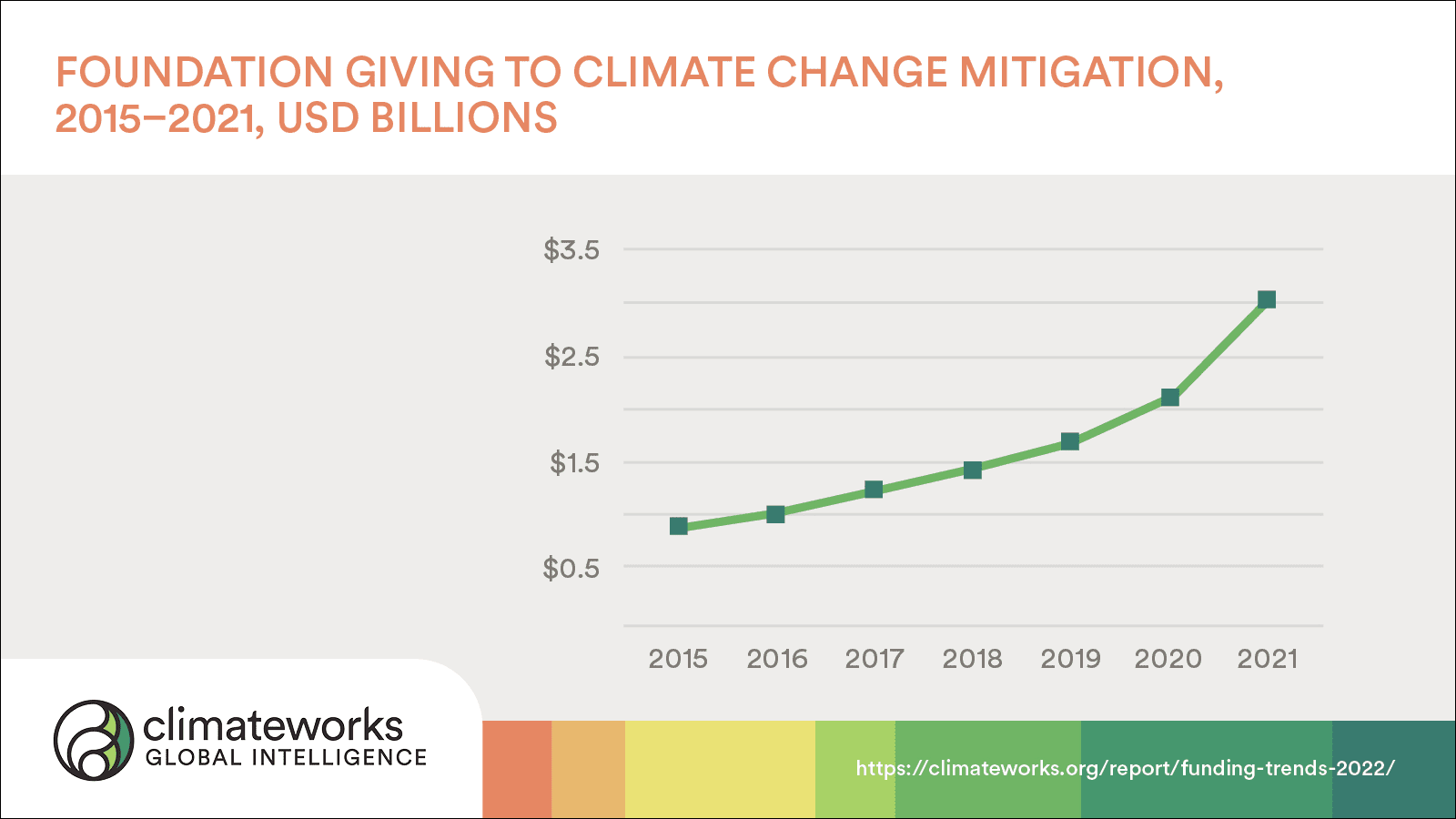
Simultaneously, the grantee community has similarly grown in recent years. Backed by philanthropic support, the total number of grantees receiving climate change mitigation funding has nearly doubled from about 1,400 in 2015 to about 2,775 in 2021 — and the total number of individual grantees receiving funds annually has increased across all regions.
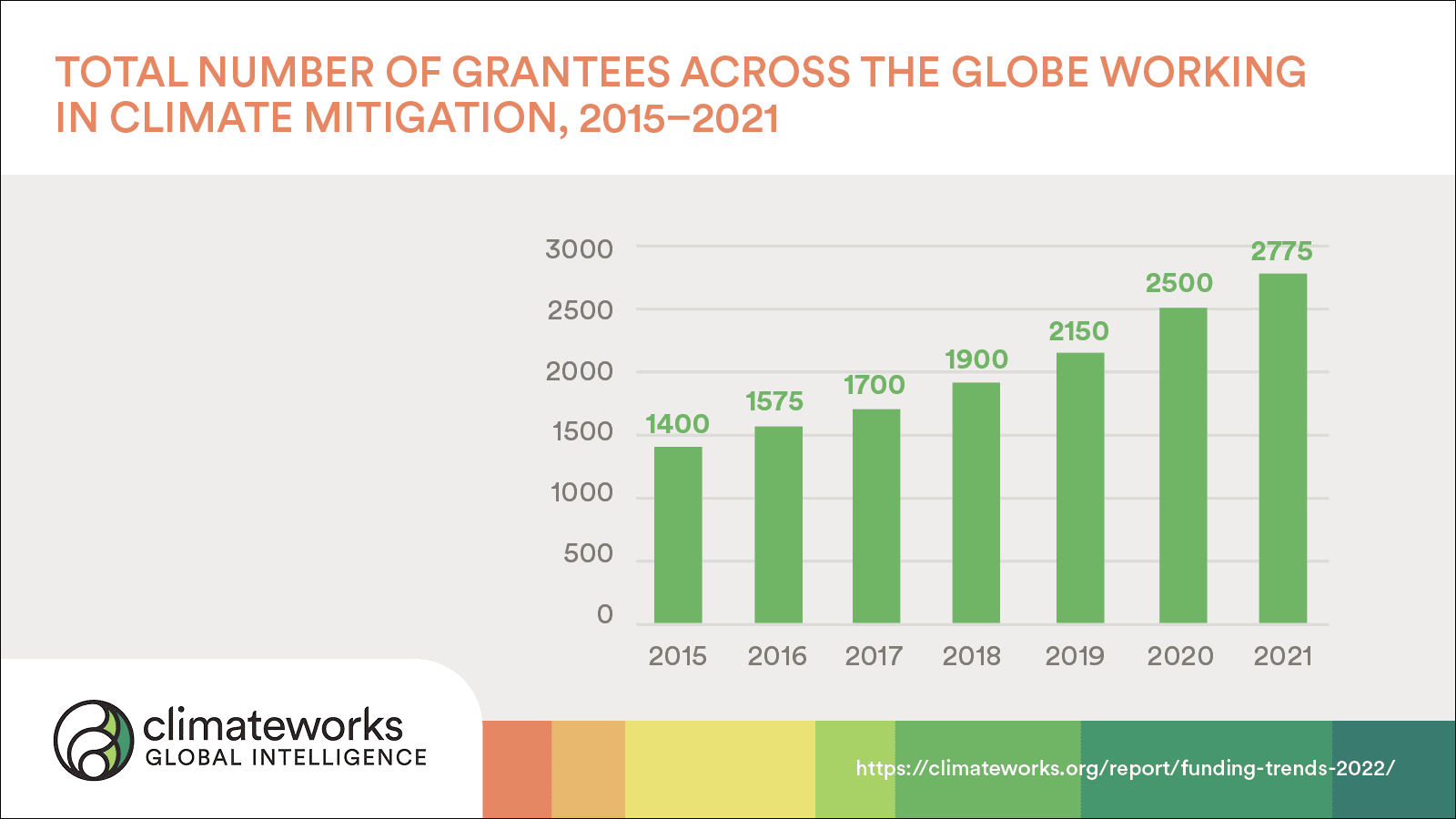
Several sectors saw especially large funding increases in 2021. Foundation funding for forests increased by 69%, driven by major new commitments such as the Indigenous People and Local Communities (IPLC) pledge and the Protecting Our Planet Challenge. Meanwhile, funding for carbon dioxide removal (CDR) increased by 62%, building on a consistent trend of growth for the sector over the last several years.
Regionally, the United States and Canada ($810 million) and Europe ($435 million) continued to receive the most foundation funding for climate change mitigation. However, the largest increases came in Latin America, which saw its funding double between 2020 and 2021, and Africa, where funding increased by 50%. Despite these increases, Latin America and Africa combined still represented less than 10% of total foundation funding for climate change mitigation in 2021.
Beyond increased funding dollars, more climate funders continued to commit over the past year to incorporating equity and justice principles into their grantmaking. Climate philanthropy also saw in 2021 the continued emergence of newer approaches and strategies. One rising trend is fossil fuel divestment, with the Ford, MacArthur, and Rockefeller foundations all announcing plans to shift their investments away from fossil fuels. In 2021, the philanthropy sector also participated in large-scale collaborations and partnered with both governments and the private sector in efforts to address climate change. Overall, as the climate philanthropy field continues to expand and mature, funders increasingly have the opportunity to advance integrated solutions, acting on climate change while simultaneously working across many social and humanitarian issues.
A decisive moment for the planet — and for climate philanthropy
It is a decisive moment for the planet. The actions taken, solutions supported, and financial resources mobilized in the coming years will have enormous implications for future generations and the possibility of securing a more just and sustainable future.
There has been compelling momentum in recent years for climate-related philanthropy — momentum that continued to accelerate in 2021. Philanthropy must continue to build on that momentum. Now is the time for funders big and small to step up their climate efforts — and to partner with a wider range of communities, movements, and organizations — to help implement climate solutions and to help ensure that humanity not only survives but thrives.
Read the full report, Funding trends 2022: Climate change mitigation philanthropy.

The ambitious new target signals that the aviation sector’s climate impact cannot be overlooked.
Today, the UN International Civil Aviation Organization (ICAO) adopted a goal for international aviation to reach net zero by 2050 during its 41st General Assembly in Montreal, Canada. This bold new target indicates that the sector’s climate impact can no longer be ignored. With this major climate development, ICAO’s 193 member states committed to finally putting aviation on a pathway compatible with the Paris Agreement goal to limit the global temperature increase to 1.5° C.
The aviation sector contributes around 5% of global greenhouse gases (CO2 and non-CO2) and demand for air travel is expected to triple by 2050. Adopting a global net-zero target for aviation provides assurance to states that have already introduced policies to address aviation’s climate impact that they are not alone. In fact, this move challenges others to act.
The 2050 target set by ICAO does not include specific emission reduction requirements for individual countries. Instead, it is left to ICAO member states to decide how they will reduce emissions from international aviation and contribute to the 2050 goal. This underscores the importance of action at the national level to establish or enhance strategies for aviation decarbonization that include comprehensive policy and regulation.
While philanthropic support has been critical to addressing climate impacts and accelerating action, the aviation sector has historically received little funding.
There are no silver bullets for aviation decarbonization. Efforts will include some combination of the scaling up of sustainable aviation fuel, including synthetic fuels; the electrification of short-haul flights; the development of hydrogen-powered aircraft; a shift in consumer behavior, including demand reduction and modal shifts; and the mitigation of non-CO2 effects, which are often overlooked.
ClimateWorks has long supported environmental organizations that comprise the International Coalition for Sustainable Aviation (ICSA). Together, the coalition acts as official civil society observers at ICAO and have contributed analysis and expertise to demonstrate that a pathway to net-zero aviation by 2050 is possible. This, in turn, helped drive the ambition that led to today’s announcement.
ICSA members will continue to engage at ICAO as the implementation phase begins, including calling for the adoption of interim targets and the consideration of non-CO2 effects in the goal. At the member state level, coalition members will continue their work to ensure the creation and adoption of ambitious plans that address the climate impact of aviation.
While philanthropic support has been critical to addressing climate impacts and accelerating action, the aviation sector has historically received little funding. According to the ClimateWorks transportation sector brief released in July 2021, only three funders are active in the aviation sector. ClimateWorks leads the only philanthropic program designed to address the climate impacts of aviation globally. While our grantmaking has contributed to progress on aviation decarbonization, we will need greater philanthropic investment to meet the challenge and opportunity of net-zero aviation.

Philanthropy must continue to help regulators understand climate change risks and how they will impact financial systems.
Central banks are in the news and for good reason. The Covid-19 pandemic and resulting economic turbulence, along with Russia’s invasion of Ukraine, have tested the abilities of these regulatory bodies. Amid these crises, the actions of central banks have reminded us of their power to effect change in our lives through monetary policy and their influence as they flex their intellectual weight in attempts to guide our economies toward a better path. And while this near-term focus is warranted, there is growing recognition that more crises are on the way, including those tied to the effects of climate change. However, the question remains whether central banks are prepared to respond.
At a minimum, the mandate of central banks and supervisors is to oversee the stability of national economies. Understanding these risks falls within the mission of these regulators. However, there are two areas that central banks and supervisors have traditionally overlooked in their risk assessments and scenario planning: (1) the physical impacts of climate-fueled natural disasters, which have been on the rise; and (2) the unforeseen transition risks created by climate-related shifts in policy, technology, consumer sentiment, or legal liabilities. Fundamentally, the failure of central banks and supervisors to understand how climate risks affect their economies represents a failure to perform their duty to the financial system.
With philanthropy’s support, central banks and supervisors can help make the financial economy more resilient to environmental shocks by incentivizing the financial system to minimize its exposures to the very sectors that drive these shocks.
Better planning for a resilient future
To help address these gaps, ClimateWorks Foundation has supported a consortium of academic organizations, researchers, and climate modelers who provide analytical support to the Network of Central Banks and Supervisors for Greening the Financial System (NGFS), a group of regulators that builds policies to address climate- and nature-related issues. The network includes the Potsdam Institute for Climate Impact Research, the International Institute for Applied Systems Analysis, the Center for Global Sustainability at the University of Maryland, Climate Analytics, and the National Institute of Economic and Social Research.
Central banks and supervisors are typically independent authorities that must base their decision-making on careful analysis and the construction of a strong evidence base that can inform their policies. This requires crucial data and analysis, and for such exercises, the academic consortium of modelers supported by ClimateWorks has created, updated, and supported the implementation and uptake of the NGFS Climate Scenarios. The third wave of updates to these scenarios, referred to as “vintage number three,” was released in September 2022. The scenarios provide a whole-economy approach to understanding climate risks from which NGFS central bankers can pilot their policy responses.
Working in close partnership with NGFS, modelers have created the only set of climate scenarios tailored to the analytical needs of central bankers and supervisors. This initiative is part of ClimateWorks’ finance strategy to help regulatory institutions understand how net-zero transitions can benefit all economies.
NGFS Climate Scenarios continue to evolve
The NGFS scenarios illustrate six different economic pathways under various levels of public and private responses to climate risks. The scenarios are not forecasts; instead, they provide a rubric to measure risk exposures under various climate policy scenarios. Low-risk scenarios depict timely or “orderly” responses; high-risk economic scenarios depict “disorderly” or delayed reactions to climate risks; and severe-risk scenarios result from current levels of action on climate. In the worst-case scenarios, climate risks have significant impacts on GDP.
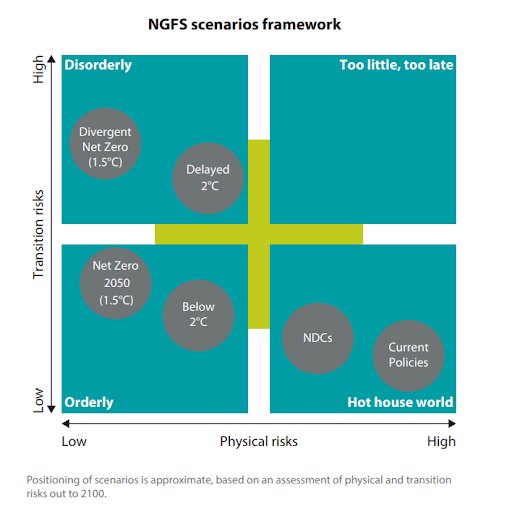
Central banks’ and supervisors’ understanding of climate risks can lead to policies that mitigate and increase resilience to future climate impacts. Central banks and supervisors can use these scenarios as a part of stress tests, for example, to inform policies that regulate financial institutions’ risk exposures to high-emitting sectors, which might limit the flow of capital to and thus exposure to risky sectors.
The scenarios have come a long way in a short amount of time. With each phase, ClimateWorks’ grantees have improved their technical capacity and data offerings in response to feedback from a wide range of stakeholders. There are several ways that grantees can further advance their efforts. They can:
- Incorporate of more macroeconomic factors (especially important given the effects of Covid-19 and related economic crises);
- Increase a granular focus on economic impacts on key sectors and various geographies;
- Publish a wider range of scenarios, including an ensemble of Net-Zero Scenarios and Divergent and Disorderly Scenarios simulating higher levels of transition and physical risk;
- Integrate of a wider range of physical impacts and their effect on the economy; and
- Improve clarity on the alignment between the NGFS Scenarios and other climate scenarios, such as the International Energy Agency’s World Energy Outlook.
While the third vintage of scenarios does not account for the Russia-Ukraine war, their outputs do anticipate economic stressors within scenario narratives. These scenarios attempt to measure how fluctuations in energy markets and climatic impacts have circular effects on the economy. As the economic impacts of combined energy and geopolitical shocks become more clear, the NGFS scenarios can continue to evolve and shed more light on future risks to the global financial system.
Work remains to demystify the level of ambition in the scenarios and their ability to model future economic risks. Central banks and regulators can address these gaps by incorporating the scenarios into their analytic operations, then setting the tone on climate ambition.
Areas for philanthropic support
The philanthropic community can build on existing momentum with the NGFS to speed the uptake of decision-useful research, such as the climate scenarios, and standardize pathways through which such information can lead to policy. Philanthropy can step up and help:
- Scale research that updates and expands scenario development that underpins a more granular understanding of climate risks;
- Support technical capacity for central banks and regulators to absorb and integrate the Climate Scenarios and related research;
- Develop global standards for the use of scenarios by central banks and supervisors; and
- Support the uptake, translation, and interpretation of these scenarios for use within the broader financial field.
With philanthropy’s support, central banks and supervisors can help make the financial economy more resilient to environmental shocks by incentivizing the financial system to minimize its exposures to the very sectors that drive these shocks.
It’s time to transform ambitious climate commitments into durable change.
Over the last two years, governments, civil society, and the private sector have mobilized to drive solutions to the climate crisis, including a wave of new net-zero emission commitments. Now, it is time to transform ambitious climate commitments into durable change — and philanthropy has a key role to play in this effort.
That’s why ClimateWorks Foundation is proud to support Climate Week in New York and the Global Energy Clean Action Forum (GCEAF) in Pittsburgh. We will gather with governments, funders, businesses, civil society, and changemakers to roll up our sleeves and get to work — and we’d like you to join us!
Hosted by our partner, the Climate Group, Climate Week (Sept 19-25) brings together changemakers to shed insights on how we are “getting it done.” Meanwhile, the Global Clean Energy Action Forum in Pittsburgh (Sept 22-23), a joint convening of the 13th Clean Energy Ministerial l (CEM13) and 7th Mission Innovation ministerial, brings together leaders from around the world to accelerate the clean energy economy.
Whether you’re joining us online via live stream and social media or in-person, here are some key events to keep in mind.
ClimateWorks at Climate Week
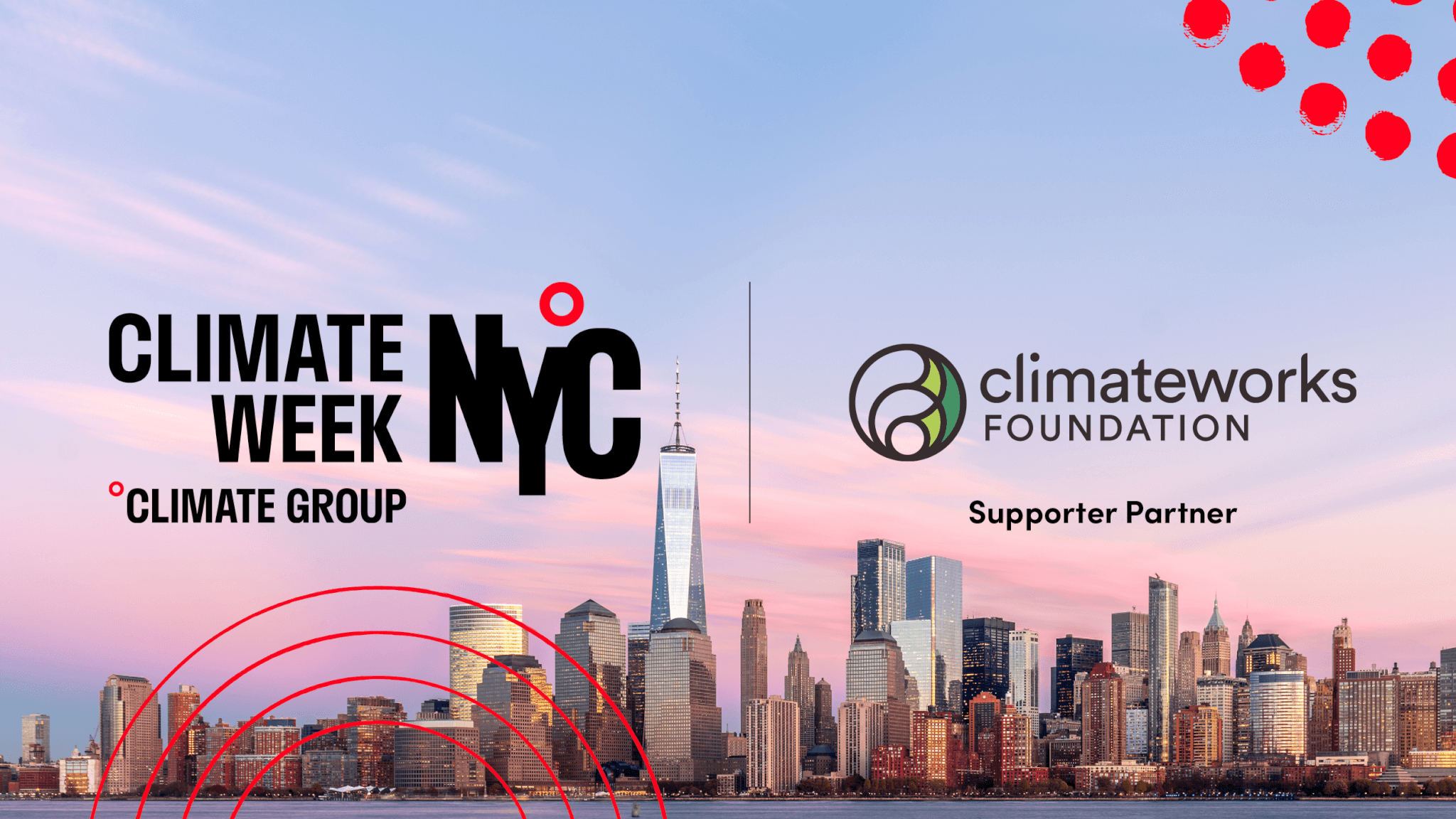
How to win in an age of extremes: Climate Group North America strategy consultation
Tuesday, September 20, 1:00 pm EDT – link to register & watch online
Post-Pandemic, we’ve swapped one age of extremes for another. With climate leadership ever more critical, how can we navigate myriad political and economic challenges to come out on top? To meet the moment, the Climate Group is refreshing its strategic approach to climate action in North America. This session convenes partner and funding organizations, including ClimateWorks’ Anthony Eggert.
Zero Emission Trucks in India – How Can We Capitalize on the Opportunity?
Tuesday, September 20, 2:30 pm EDT – link to register & watch online
In India, medium and heavy trucks comprise 2% of the vehicle population but contribute to over 30% of the overall road transport emissions. This disproportionate share of emissions drives the need for a transition to Zero Emission Trucks. We ask policymakers, automakers, civil society, and donors about how we can unlock this in India.
Break the ICE: the role global partnerships play in driving the zero-emission vehicle transition
Wednesday, September 21, 9:00 am EDT – link to register & watch online
Ambitious targets require innovative action. Partnerships between business and government can play a crucial role in driving the transition away from internal combustion engine (ICE) vehicles. Join us to hear how our partners are driving the zero-emission vehicle transition together. Hosted by the Climate Group and moderated by Monica Araya, Drive Electric Campaign Steering Committee member and a Distinguished Fellow at ClimateWorks Foundation.
ClimateWorks at the Global Clean Energy Action Forum

Green Public Procurement in Practice Today
Thursday, September 22, 1:45 to 2:45 pm EDT – more information here
Heavy industry, including steel and cement, is responsible for one-third of human-caused GHG emissions, and governments are the largest individual customers for these materials. Through the wide adoption of green public procurement (GPP) policies, they can help shape the clean material economy of tomorrow and achieve our net zero goals. This session convenes partner organizations and is moderated by ClimateWorks’ Scott Shell.
Investment and Finance for the Clean Energy Transition in Emerging and Developing Economies
Friday, September 23, 9 to 10 am EDT – more information here
While accounting for two-thirds of the global population, emerging and developing economies only represent one-fifth of total investment in clean energy. Accelerating clean energy investment in these regions is essential to keep net zero and sustainable development objectives in sight. This session is sponsored by ClimateWorks and features our very own Dan Plechaty.
Hotspots: India, Saudi Arabia & Finland on the Global Hydrogen Economy
Friday, September 23, 9 to 10 am EDT – more information here
Clean hydrogen is a game changer in the global energy industry by storing renewables, complementing electrification, addressing climate challenges, and having the potential to become a multi-trillion-dollar global market. India, Saudi Arabia, and Finland have all been identified as clean hydrogen hotspots due to their tremendous renewable energy capacities and technological know-how. Ministerial representatives of these three trailblazers will take the stage in this side event and explain the content and ambitions of their national hydrogen strategies.
Coalitions facilitating the technology pathways for net zero industries
Friday, September 23, 10:15 to 11:15 am EDT – more information here
The decarbonization of energy-intensive industrial sectors, including steel and cement, requires accelerated deployment of technologies that are not yet fully commercialized, like hydrogen and carbon capture. The goal of this session is to raise awareness of the readiness of various technologies in driving industrial decarbonization and deliver recommendations on how to align the supply and demand side for net zero technologies. Moderated by ClimateWorks’ Rebecca Dell, and featuring opening remarks from Secretary of Energy Jennifer Granholm.
From blindspot to hotspot: accelerating the transition to sustainable cooling for climate mitigation and adaptation
Friday, September 23, 11:30 am to 1:45 pm EDT – more information here
The latest IPCC reports are clear: climate change is already upon us, disrupting the lives of billions of people, including with prolonged extreme heat. This session will bring together government representatives, CEOs, and global experts to showcase best practices to date, including the ambitious efforts ongoing in India, and to raise the profile of sustainable cooling, at CEM and beyond, as a key piece of the puzzle in the energy transition and achievement of sustainable development. Featuring partner organizations of ClimateWorks’ Clean Cooling Collaborative (CCC) and co-moderated by CCC Program Director Noah Horowitz.
Partners at Climate Week
India’s big idea: a roadmap for net zero
Tuesday, 9/20 at 8:30 am EDT – link to register & watch online
By 2030, India’s green economy could contribute more than $1 trillion dollars globally. By 2050, this could rise to $15 trillion dollars. We ask critical influencers from government, business and wider society to explore how we can unlock the opportunities presented by greater climate action in India. Hosted by the Climate Group.
Accountability in action: ensuring equity considerations are built into sustainability investments across America
Tuesday, 9/20 at 9:00 am EDT – link to register & watch online
Accelerating US climate action requires an all-of-society approach with momentum coming from everywhere including federal and state governments, as well as private and philanthropic sectors. Join us for a robust discussion with US leadership on how to further US climate reductions, increase community resilience, and center people in our climate transition. Accelerating US climate action requires an all-of-society approach with momentum coming from everywhere including federal and state governments, as well as private and philanthropic sectors. Join us for a robust discussion with US leadership on how to further US climate reductions, increase community resilience, and center people in our climate transition.
Accelerating corporate support for Advanced Clean Cars II Program
Tuesday, 9/20 at 12:00 pm EDT – link to register & watch online
Companies from across the nation are leading the transition to electric vehicles (EVs) as they look to lower operating costs, reduce exposure to volatile fossil fuel prices, and meet climate goals in accordance with investor and consumer expectations. California’s Advanced Clean Cars II program will help businesses access the EV models they need to meet their electrification goals by requiring an increasing number of EVs to be made available each year. Hosted by Ceres.
Are we there yet? Steering the global market towards EV100
Tuesday, 9/20 at 1:00 pm EDT – link to register & watch online
Climate Week NYC 2022 marks the fifth anniversary of Climate Group’s global electric transport initiative, EV100. For five years, members – which include some of the world’s largest businesses – have been leading the way in driving the electric vehicle transition globally. But change must happen faster. Can our success and progress so far steer global markets towards EV100? Hosted by the Climate Group.
Sustainable Freight Buyers Alliance (SFBA) Members & Partners meeting
Wednesday, 9/21 at 10:00 am EDT – link to register
Sustainable Freight Buyers Alliance (SFBA) is uniting corporate freight buyers and freight decarbonization initiatives to shift towards zero-emission freight across all modes of transport globally. Led by Smart Freight Centre (SFC) and co-founded with BSR and the World Economic Forum (WEF), to bring about systems change in the freight and logistics sector,. SFBA is a valuable platform that enables concrete action by catalyzing collaboration, accommodating tools and solutions, and tracking and demonstrating progress.
Unlocking Collaboration across the Americas
Wednesday, 9/21 at 1:00 pm EDT – link to register & watch online
States, regions, and businesses across the Americas face common challenges when addressing and implementing climate policy. Shared borders, geography, and trade agreements mean that successful climate policies are dependent on collaboration. This session aims to address these common challenges and highlight potential shared solutions by breaking down silos between government, business, and other key stakeholders. In this way we can enable meaningful collaboration and identify key target areas for long-lasting and sustainable public-private partnerships. Hosted by the Climate Group and sponsored by PwC.
Partners at the Global Clean Energy Action Forum
Zero-emission truck global expo
Thursday to Friday, September 22 to 23 – more information here
The Zero-Emission Truck (ZET) Global Expo is part of the Global Clean Energy Action Forum. The annual event brings together the world’s largest and leading countries, companies and international experts with the goal of accelerating clean energy transitions and addressing the climate crisis. The CALSTART Zero-Emission Truck Global Expo showcase will be on display outside the David L. Lawrence Convention Center on Fort Duquesne Blvd in Pittsburgh. More than a dozen zero-emission trucks are scheduled to be on display.
Zero-emission heavy-duty transportation: multiple events by CALSTART
Thursday to Friday, September 22 to 23 – more information here
Drive to Zero and CALSTART will jointly host a panel discussion on zero-emission “fleets of the future” as well as a side event workshop on heavy-duty charging infrastructure. Participating organizations include the Smart Freight Centre, Chargepoint, the International Council on Clean Transportation (ICCT), and others. Register for free for the Global Clean Energy Action Forum/Clean Energy Ministerial to learn more and find details.
Electric vehicles, batteries and charging infrastructure business forum
Thursday, September 22 at 1:15 pm EDT – more information here
The Electrification Coalition will be leading the Electric Vehicles, Batteries and Charging Infrastructure Business Forum Room on Thursday, September 22 from 1:15 to 4:15 pm ET, as part of the Global Clean Energy Action Forum in Pittsburgh, September 21–23. Registration is free online. We hope to see you there!
How to accelerate the transition to ZEVs?
Scheduling TBD – more information here
The transition to ZEV is happening. Great progress around the world on targets, policies and markets. With joint efforts, governments and industry can push it even faster. This opening event will be a ‘call to action’ to tackle remaining challenges, namely charging infrastructure roll-out, management of grid integration, global supply chains and a special focus on deployments in segments such as medium- and heavy-duty vehicles. This high-level event is hosted by Drive to Zero and CALSTART, with participation from the ZEV Transition Council and others.
How collaboration can speed up freight decarbonization
Organized by: Smart Freight Centre – more information here
SFC brings together multi-nationals, forwarders & carriers, NGOs, and governments in our collaborative initiatives, trainings and programs. Together, we help solve the business challenges behind reducing freight emissions and impact the industry standards. Our goal is to guide the industry to track and reduce its GHG emissions by 1 billion tons by 2030 and reach zero emissions by 2050 or earlier. This is the one event to bring together the global community of shippers on decarbonization at scale. We need to accelerate the transition by de-risking finance towards an unprecedented change from fossil fuels to zero-emission technology via electrification of road freight and green vessel technology. This meeting will showcase the action taken and commitment from multinationals to achieve the 1.5-degree scenario by leading the way. We would like to organize this event in collaboration with global partners, aiming to present to the logistics community, including the logistics supply providers, their carriers and the world’s largest multinationals the blueprints to decarbonize logistics.
Building Leadership and Accelerating Action on Steel Decarbonization in Asia: Experiences of India and the Republic of Korea
Friday, September 23 at 10:15 am EDT – more information here
Today’s global clean energy moment is a pivotal turning point to transform our ambitious energy commitments into action while we ensure security of supply. Our goal with this meeting is to create a renewed focus on tangible, near-term progress in decarbonizing our energy systems while creating millions of good-paying jobs and ensuring energy security. As a result, we have a simple but essential theme: Rapid Innovation and Deployment. Co-sponsored by our partners The Energy and Resources Institute (TERI) and Solutions for our Climate (SFOC).




